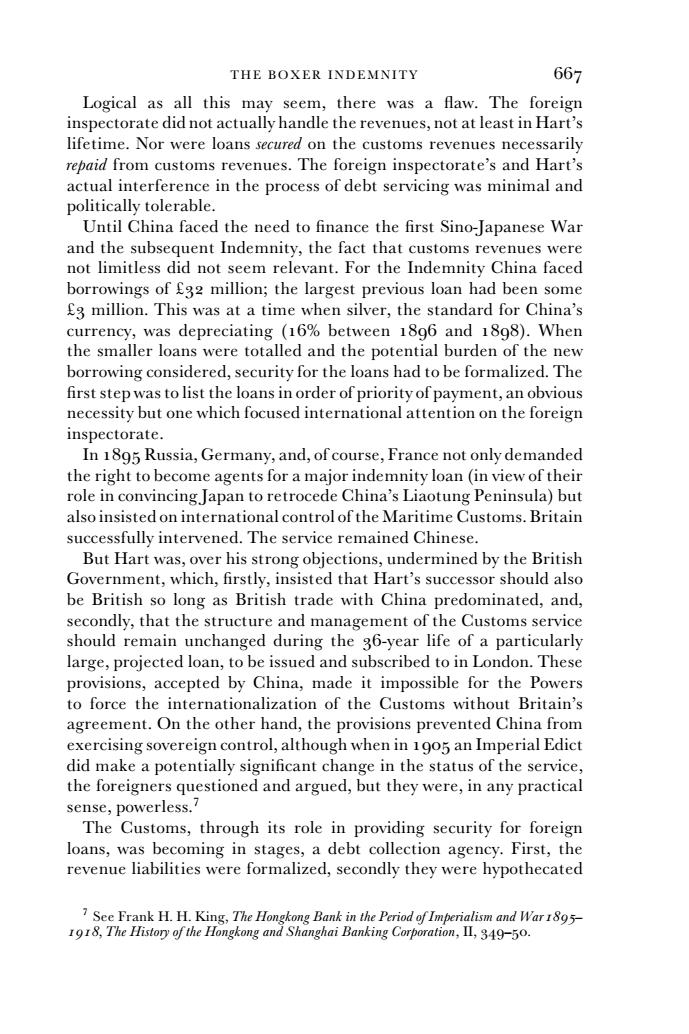正在加载图片...

THE BOXER INDEMNITY 667 Logical as all this may seem,there was a flaw.The foreign inspectorate did not actually handle the revenues,not at least in Hart's lifetime.Nor were loans secured on the customs revenues necessarily repaid from customs revenues.The foreign inspectorate's and Hart's actual interference in the process of debt servicing was minimal and politically tolerable. Until China faced the need to finance the first Sino-Japanese War and the subsequent Indemnity,the fact that customs revenues were not limitless did not seem relevant.For the Indemnity China faced borrowings of f32 million;the largest previous loan had been some E3 million.This was at a time when silver,the standard for China's currency,was depreciating (16%between 1896 and 1898).When the smaller loans were totalled and the potential burden of the new borrowing considered,security for the loans had to be formalized.The first step was to list the loans in order of priority of payment,an obvious necessity but one which focused international attention on the foreign inspectorate. In 1895 Russia,Germany,and,of course,France not only demanded the right to become agents for a major indemnity loan(in view of their role in convincing Japan to retrocede China's Liaotung Peninsula)but also insisted on international control of the Maritime Customs.Britain successfully intervened.The service remained Chinese. But Hart was,over his strong objections,undermined by the British Government,which,firstly,insisted that Hart's successor should also be British so long as British trade with China predominated,and, secondly,that the structure and management of the Customs service should remain unchanged during the 36-year life of a particularly large,projected loan,to be issued and subscribed to in London.These provisions,accepted by China,made it impossible for the Powers to force the internationalization of the Customs without Britain's agreement.On the other hand,the provisions prevented China from exercising sovereign control,although when in 1905 an Imperial Edict did make a potentially significant change in the status of the service, the foreigners questioned and argued,but they were,in any practical sense,powerless.7 The Customs,through its role in providing security for foreign loans,was becoming in stages,a debt collection agency.First,the revenue liabilities were formalized,secondly they were hypothecated 7See Frank H.H.King,The Hongkong Bank in the Period of Imperialism and War1895- 1918,The History of the Hongkong and Shanghai Banking Corporation,II,349-50.THE BOXER INDEMNITY 667 Logical as all this may seem, there was a flaw. The foreign inspectorate did not actually handle the revenues, not at least in Hart’s lifetime. Nor were loans secured on the customs revenues necessarily repaid from customs revenues. The foreign inspectorate’s and Hart’s actual interference in the process of debt servicing was minimal and politically tolerable. Until China faced the need to finance the first Sino-Japanese War and the subsequent Indemnity, the fact that customs revenues were not limitless did not seem relevant. For the Indemnity China faced borrowings of £32 million; the largest previous loan had been some £3 million. This was at a time when silver, the standard for China’s currency, was depreciating (16% between 1896 and 1898). When the smaller loans were totalled and the potential burden of the new borrowing considered, security for the loans had to be formalized. The first step was to list the loans in order of priority of payment, an obvious necessity but one which focused international attention on the foreign inspectorate. In 1895 Russia, Germany, and, of course, France not only demanded the right to become agents for a major indemnity loan (in view of their role in convincing Japan to retrocede China’s Liaotung Peninsula) but also insisted on international control of the Maritime Customs. Britain successfully intervened. The service remained Chinese. But Hart was, over his strong objections, undermined by the British Government, which, firstly, insisted that Hart’s successor should also be British so long as British trade with China predominated, and, secondly, that the structure and management of the Customs service should remain unchanged during the 36-year life of a particularly large, projected loan, to be issued and subscribed to in London. These provisions, accepted by China, made it impossible for the Powers to force the internationalization of the Customs without Britain’s agreement. On the other hand, the provisions prevented China from exercising sovereign control, although when in 1905 an Imperial Edict did make a potentially significant change in the status of the service, the foreigners questioned and argued, but they were, in any practical sense, powerless.7 The Customs, through its role in providing security for foreign loans, was becoming in stages, a debt collection agency. First, the revenue liabilities were formalized, secondly they were hypothecated 7 See Frank H. H. King, The Hongkong Bank in the Period of Imperialism and War1895– 1918, The History of the Hongkong and Shanghai Banking Corporation, II, 349–50